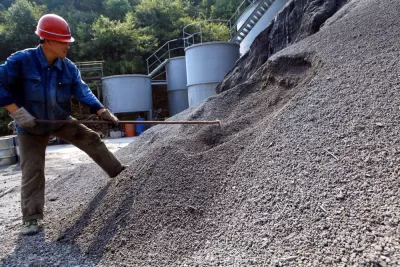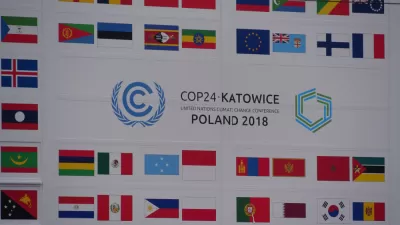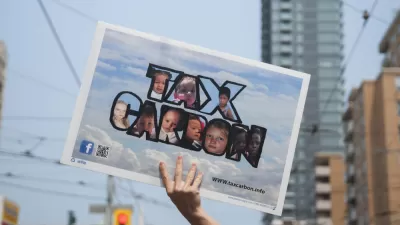The sobering news comes from the Rhodium Group, a research firm that tracks CO2 emissions. The preliminary estimate is the third in two months to show an increase in 2018, attributing it to an improved economy and Trump's regulation rollbacks.

"The findings, published Tuesday by the independent economic research firm Rhodium Group, mean that the United States now has a diminishing chance of meeting its pledge under the 2015 Paris climate agreement to dramatically reduce its emissions by 2025," report Chris Mooney Brady Dennis for The Washington Post.
While President Trump initiated the withdrawal from the global agreement on June 1, 2017, the only nation to do so, the U.S. remains officially in it until November 2020, four years after the agreement took effect.
“We have lost momentum. There’s no question,” Rob Jackson, a Stanford University professor who studies emissions trends, said of both U.S. and global efforts to steer the world toward a more sustainable future.
The sharp emissions rise was fueled primarily by a booming economy, researchers found. But the increase, which could prove to be the second-largest in the past 20 years, probably would not have been as stark without Trump administration rollbacks, said Trevor Houser, a partner at Rhodium.
“The big takeaway for me is that we haven’t yet successfully decoupled U.S. emissions growth from economic growth,” Houser told Brad Plumer of The New York Times.
As United States manufacturing boomed, for instance, emissions from the nation’s industrial sectors — including steel, cement, chemicals and refineries — increased by 5.7 percent.
Houser told NPR (audio available) that based on preliminary data, emissions in the U.S. grew by the highest rate since 2010. "The big drivers were increased electricity demand and growth in trucking and aviation," reports Geoff Brumfiel.
Surprisingly, emissions from passenger vehicles decreased ever so slightly, "highlight(ing) the challenges in decarbonizing the transportation sector beyond light-duty vehicles," according to the report:
The transportation sector retained its title as the largest source of CO2 emissions in the US for the third year running (Figure 4).
During the first nine months of the year, gasoline demand declined by 0.1% as modest efficiency gains offset a minor increase in vehicle miles traveled (Figure 5). But robust growth in demand for both trucking and air travel increased demand for diesel and jet fuel by 3.1% and 3.0%, respectively.
"The Rhodium report is not the first clue that 2018 was basically a terrible year for the climate," writes Robinson Meyer for The Atlantic.
Last month, two studies and also found that worldwide carbon emissions surged in 2018. This change is a discouraging sign, since global emissions stagnated through the middle of the decade.
Meyer refers to reports prepared by the Global Carbon Budget and a team led by Stanford Professor Rob Jackson.
Related in Planetizen:
-
Major Increase in Global Carbon Emissions Projected for 2018, December 7, 2018The report from the Global Carbon Project, an international group of scientists who track greenhouse gas emissions, comes as a surprise as emissions had been relatively flat for the last four years. Global emissions this year will increase 2.7%.
-
Greenhouse Gas Emissions Continue to Decrease in the U.S., October 23, 2018President Trump and his cabinet have been busy rolling back environmental regulations and promoting coal burning, and now they claim credit for a reduction in greenhouse gas emissions last year even greater than in 2016.
FULL STORY: U.S. greenhouse gas emissions spiked in 2018 — and it couldn’t happen at a worse time

Alabama: Trump Terminates Settlements for Black Communities Harmed By Raw Sewage
Trump deemed the landmark civil rights agreement “illegal DEI and environmental justice policy.”

Study: Maui’s Plan to Convert Vacation Rentals to Long-Term Housing Could Cause Nearly $1 Billion Economic Loss
The plan would reduce visitor accommodation by 25% resulting in 1,900 jobs lost.

Planetizen Federal Action Tracker
A weekly monitor of how Trump’s orders and actions are impacting planners and planning in America.

Wind Energy on the Rise Despite Federal Policy Reversal
The Trump administration is revoking federal support for renewable energy, but demand for new projects continues unabated.

Passengers Flock to Caltrain After Electrification
The new electric trains are running faster and more reliably, leading to strong ridership growth on the Bay Area rail system.

Texas Churches Rally Behind ‘Yes in God’s Back Yard’ Legislation
Religious leaders want the state to reduce zoning regulations to streamline leasing church-owned land to housing developers.
Urban Design for Planners 1: Software Tools
This six-course series explores essential urban design concepts using open source software and equips planners with the tools they need to participate fully in the urban design process.
Planning for Universal Design
Learn the tools for implementing Universal Design in planning regulations.
Caltrans
Smith Gee Studio
Institute for Housing and Urban Development Studies (IHS)
City of Grandview
Harvard GSD Executive Education
Toledo-Lucas County Plan Commissions
Salt Lake City
NYU Wagner Graduate School of Public Service





























